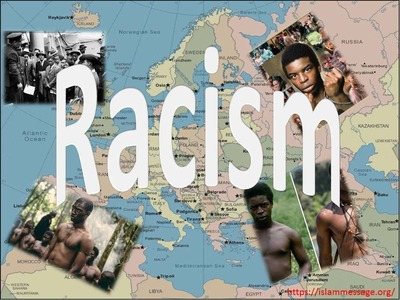
Explaining how Islam approached the racial discrimination issue, Dr. Wael Hamza highlighted in part 1 how Islam changed the prevalent racist beliefs and reformed people’s perception of race.
This part focuses on the practical side, showing how Islam brought about an anti-racism environment.
Develop Healthy Environment
Bilal ibn Rabah: Story of Unbreakable Companion
Below is a simple, yet very effective, set of actions that created anti-racism environment in Madinah. To understand those examples, let us briefly talk about Bilal ibn Rabah, the main figure in many of these stories.
Bilal was a black Abyssinian slave who was one of the first people to embrace Islam. Despite his slavery, Bilal was a person of dignity and courage. When his master discovered that Bilal is a Muslim, he tortured and humiliated him in the streets of Makkah, making an example of him to all other slaves who are considering Islam.
Yet, Bilal was steadfast and refused to give in or abandon Islam. Abu Bakr As-Siddiq bought Bilal and set him free. Around Bilal many of the stories below happened.
Acknowledging Value
The Prophet showed respect and value to people around him despite their race, color, gender, or even age:
Amr ibn Al-`As asked the Prophet (PBUH): “Who is the most beloved to you O Messenger of Allah?” The Prophet answered, “Aishah,” a woman and the Prophet’s wife. (Al-Bukhari)
Talking about a young man, Abdullah ibn Umar, the Prophet said “What a man Abdullah is!” (Al-Bukhari)
Bilal, the black man, was no different: “Tell me of the best deed you did after embracing Islam. I have heard the sound of your footsteps in front of me in Paradise!” The Prophet talking to Bilal. (Al-Bukhari)
Umar Ibn Al Khattab used to say about Bilal, “Abu Bakr is our master and he set free our master (meaning Bilal).” (Al-Bukhari)
These comments were not fake comments. They were genuine and sincere comments that made a huge impact on the environment.
Assigning Important Positions
How Quran Views Diversity (Video)
How Qur'an Views Diversity
Prayer in Islam is the most important deed and it had the most value during the time of the Prophet. Calling for congregational prayer with the Prophet is a very noble action. Al-Mu’azzin, the one who calls for prayer, is a very honorable person, let alone the Mu’azzin of the Prophet. That was Bilal! He had such a beautiful voice and the Prophet assigned him such a task for the quality voice he had.
An environment in which race plays no role in assigning responsibilities and only skills and qualifications are considered is an environment where racial discrimination has no place. Five times every day, a black man demonstrates that publicly in front of everyone calling people to prayer.
Condemning Racist Actions
Although the ideas were clear, people continued to carry some traces of the wrong ideas they grew up on. In a conflict between Bilal and another great companion of the Prophet, Abu Dharr, the latter told Bilal, “O son of a black woman.”
📚 Read Also: Seerah Of Prophet Muhammad – Conversions Of Omar & Hamza Plus Boycott
When Prophet (PBUH) heard about this comment, he rebuked Abu Dharr and told him, “O Abu Dharr, you are a man who still have traces of ignorance.“
Abu Dharr, realizing how severe his mistake was, asked the Prophet for forgiveness and he looked for Bilal to apologize. The word was an aggressive word and so was the form of apology. Abu Dharr put his face on the ground in front of Bilal telling him to step on it to retaliate.
Bial, in return, kisses his face and they hug while their eyes are full of tears. It is the assertive condemnation of the Prophet that established such a norm: there is no place for racism in this environment.
Muslim Rituals Are Anti-racism
How Malcolm X Hajj Transformed Him
Malcolm X and the Transforming Power of Hajj
Rituals such as prayer are live demonstration of equality. There is no preference in lining up for prayer: no preference based on race, clan, wealth, or political status.
Pilgrimage is another demonstration of equality between people despite their background. In fact, pilgrimage is a yearly enforcement of the idea of equality through a very large event that the whole world experiences. Pilgrimage experience is what made someone like Malcolm X change his idea of black supremacy and embrace Islam and its concept of equality.
Conclusion
It is safe to conclude that The Prophet (peace and blessings be upon him) and his companions created anti-racism environment and promoted equality through action and practice.
Racism will probably continue to infect societies and discrimination will continue to exist. It is, however, the duty of every free individual, group, and nation to fight it and put an end to it.
In Islam and its guidance is a cure to all of humanity’s problems no matter how tough. Racial discrimination is no difference.


